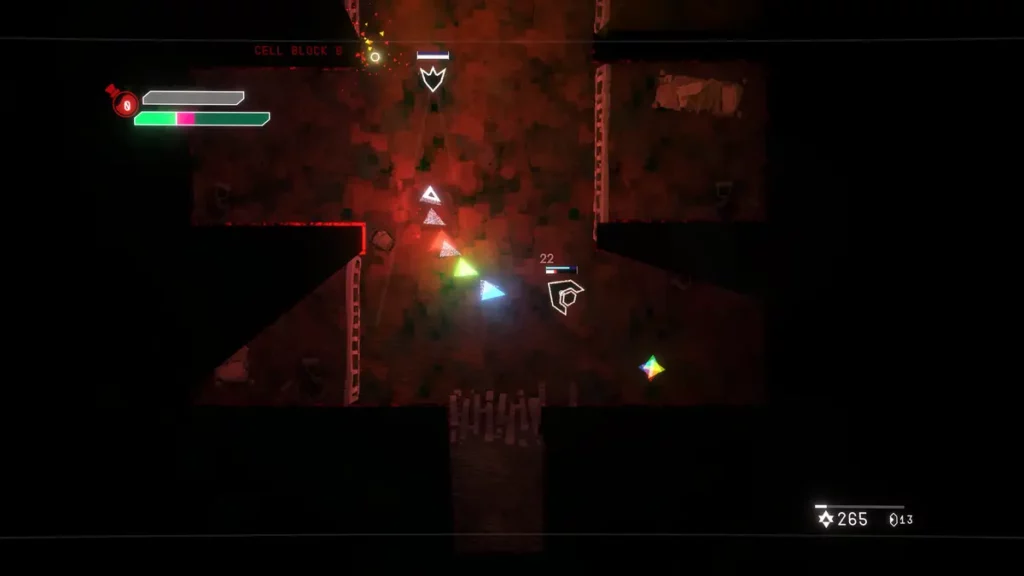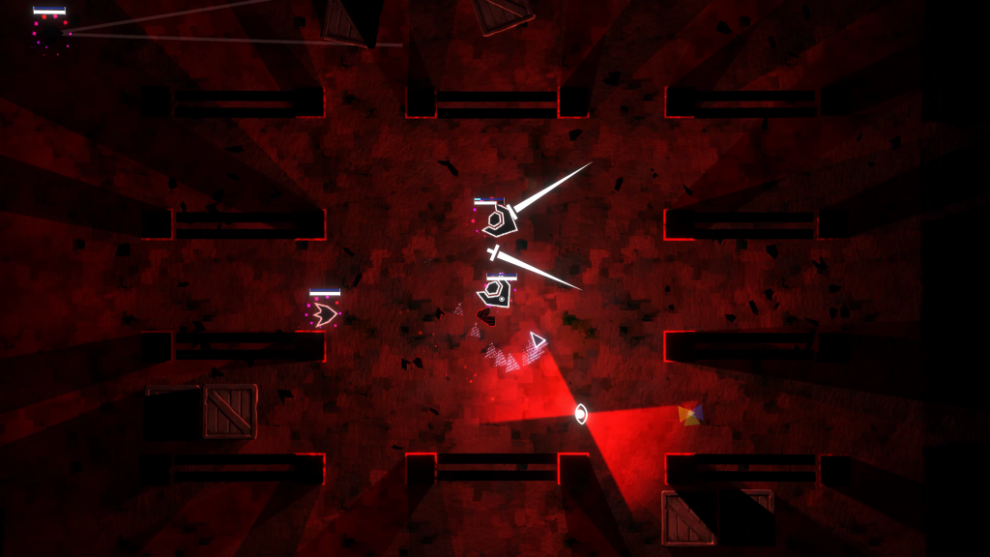Finite Reflection Studios’ latest release, Void Sols, emerges as a striking testament to how simplicity and innovative design can breathe fresh life into a well-worn genre. Released on November 12, 2024, this $20 indie title strips the soulslike formula down to its geometric essence, proving that sometimes less truly is more – even in a genre known for its complexity.
At first glance, Void Sols might seem almost absurdly minimalist: players control a simple white triangle, evoking memories of classic arcade games like Asteroids. However, this deliberate design choice quickly reveals itself as a masterful stroke of creativity. The game transforms basic geometric shapes into menacing adversaries, turning hexagons and squares into formidable foes that stalk the player through its shadowy mazes. It’s remarkable how effectively the game manages to imbue these simple shapes with personality and menace, creating encounters that feel as threatening as any realistically rendered monster.
The game’s standout feature is its revolutionary approach to lighting and shadow play. In a genre where darkness is often used as a mere aesthetic choice, Void Sols makes it a central gameplay mechanic. The environment is shrouded in darkness that players must navigate by lighting torches scattered throughout the world. This isn’t just about visibility – it’s a crucial tactical element. Light becomes both friend and foe, as players must carefully manage their position relative to light sources. Your triangular avatar might inadvertently cast shadows that conceal deadly enemies, while pillars and corners hide threats in their umbra, waiting to ambush the unwary.
Navigation through this dark world is an exercise in careful exploration and strategic thinking. Each new area begins as a complete mystery, with no map and minimal guidance. Players must inch forward carefully, lighting torches that serve double duty as checkpoints and location markers, offering brief text descriptions that hint at the world’s dark nature – “Prison Cell,” “Torture Chamber,” and other equally cheerful locales. The game’s approach to mapping is particularly intriguing, as the maps players eventually discover are deliberately incomplete and somewhat unreliable, showing only basic layouts and seemingly impossible-to-reach item locations. This design choice transforms every area into an engaging puzzle that rewards thorough exploration and clever thinking.
Combat in Void Sols strikes a satisfying balance between accessibility and depth. The core mechanics revolve around dodging, though players can eventually discover shields and various weapons that allow for different playstyles. The game’s progression system shows thoughtful modernization of soulslike conventions – any items discovered can be replenished at rest points, eliminating the common genre frustration of permanent item loss. Character building is equally flexible, with the ability to reset and reassign stats across speed, strength, dexterity, and health at will. Weapon upgrades apply universally, and their stat boosts can be freely swapped, creating a surprisingly accommodating system that encourages experimentation.
Where Void Sols truly shines is in its environmental design. Despite treading familiar territory with prisons, forests, and mountains, the game’s minimalist aesthetic and clever use of lighting make these locations feel fresh and genuinely atmospheric. The mountain areas are particularly noteworthy, where distant orange bonfires pierce the darkness and bitter cold actively depletes the player’s health, creating a palpable sense of hostility and isolation. The prison sections are deviously designed mazes that challenge players’ spatial awareness and problem-solving abilities, while later areas subvert expectations about how a game with this visual style should behave.
However, the game isn’t without its challenges – both intentional and otherwise. The difficulty curve, mostly well-calibrated throughout the experience, takes a sharp upward turn near the end. The third-to-last boss fight stands out as particularly demanding, complete with multiple phases and, more problematically, stability issues that can lead to crashes. This is followed by a gauntlet of enemies that feels more like artificial padding than thoughtful design. Fortunately, the game recovers its footing in its final moments, returning to its strengths of atmospheric exploration and clever environmental puzzles.
Despite these late-game stumbles, Void Sols manages to carve out its own identity in the crowded soulslike genre. Its quality-of-life improvements, such as replenishable items and flexible character building, feel like features that should become genre standards. The game’s unique visual style and innovative use of lighting mechanics prove that there’s still room for creative interpretation within the soulslike framework.
For $20, Void Sols offers a compelling package that will likely take most players around twelve hours to complete, though thorough explorers will find plenty of secrets to uncover in subsequent playthroughs. While it may not revolutionize the genre, it demonstrates how thoughtful design and artistic restraint can create a memorable experience that stands out from its peers. The game is currently available on PC, with Steam Deck compatibility yet to be announced.
In a gaming landscape where many titles compete to add more features and complexity, Void Sols shows that sometimes the most effective approach is to strip things down to their essence. It’s a game that proves you don’t need elaborate graphics or complex systems to create an engaging, atmospheric experience – sometimes all you need is a triangle, some shadows, and a whole lot of clever design.















Add Comment